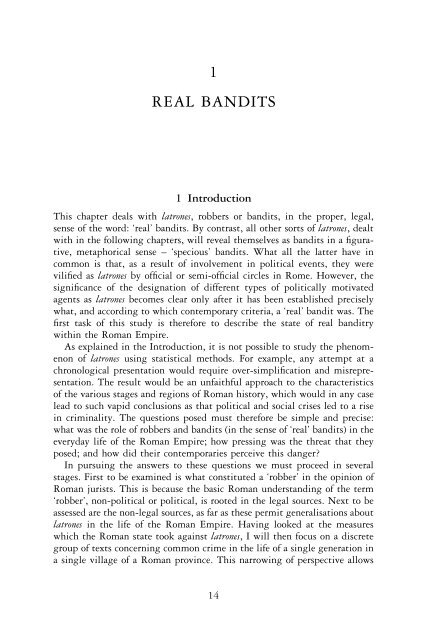Create successful ePaper yourself
Turn your PDF publications into a flip-book with our unique Google optimized e-Paper software.
BANDITS IN THE ROMAN EMPIRE<br />
1<br />
REAL BANDITS<br />
1 Introduction<br />
This chapter deals with <strong>latrones</strong>, robbers or bandits, in the proper, legal,<br />
sense of the word: ‘real’ bandits. By contrast, all other sorts of <strong>latrones</strong>, dealt<br />
with in the following chapters, will reveal themselves as bandits in a figurative,<br />
metaphorical sense – ‘specious’ bandits. What all the latter have in<br />
common is that, as a result of involvement in political events, they were<br />
vilified as <strong>latrones</strong> by official or semi-official circles in Rome. However, the<br />
significance of the designation of different types of politically motivated<br />
agents as <strong>latrones</strong> becomes clear only after it has been established precisely<br />
what, and according to which contemporary criteria, a ‘real’ bandit was. The<br />
first task of this study is therefore to describe the state of real banditry<br />
within the Roman Empire.<br />
As explained in the Introduction, it is not possible to study the phenomenon<br />
of <strong>latrones</strong> using statistical methods. For example, any attempt at a<br />
chronological presentation would require over-simplification and misrepresentation.<br />
The result would be an unfaithful approach to the characteristics<br />
of the various stages and regions of Roman history, which would in any case<br />
lead to such vapid conclusions as that political and social crises led to a rise<br />
in criminality. The questions posed must therefore be simple and precise:<br />
what was the role of robbers and bandits (in the sense of ‘real’ bandits) in the<br />
everyday life of the Roman Empire; how pressing was the threat that they<br />
posed; and how did their contemporaries perceive this danger?<br />
In pursuing the answers to these questions we must proceed in several<br />
stages. First to be examined is what constituted a ‘robber’ in the opinion of<br />
Roman jurists. This is because the basic Roman understanding of the term<br />
‘robber’, non-political or political, is rooted in the legal sources. Next to be<br />
assessed are the non-legal sources, as far as these permit generalisations about<br />
<strong>latrones</strong> in the life of the Roman Empire. Having looked at the measures<br />
which the Roman state took against <strong>latrones</strong>, I will then focus on a discrete<br />
group of texts concerning common crime in the life of a single generation in<br />
a single village of a Roman province. This narrowing of perspective allows<br />
14


